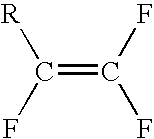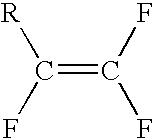Method for producing fluorinated organic compounds
a technology of fluorinated organic compounds and gas phase reaction, which is applied in the preparation of halogenated hydrocarbons, physical/chemical process catalysts, hydrogen halide split-off, etc., can solve the problems of solvent health risks, solvent health risks, environmental contamination risk, etc., and achieve the effect of product separation and purification. economical
- Summary
- Abstract
- Description
- Claims
- Application Information
AI Technical Summary
Benefits of technology
Problems solved by technology
Method used
Image
Examples
examples
[0033] Additional features of the present invention are provided in the following examples, which should not be construed as limiting the claims in any way.
examples 1-5
[0034] These examples show the activity of different catalysts.
Catalyst Preparation:
Catalyst A
[0035] A catalyst comprising activated carbon impregnated with SbF5 is prepared by first drying 100 g of activated carbon in a oven at 180° C. under vacuum for 72 hours. After drying, the carbon is covered with aluminum foil and then cooled gradually to room temperature under vacuum.
[0036] A 250 ml HDPE bottle is flushed with anhydrous N2 to remove ambient air. Approximately 50 g of the dried activated carbon is then placed in the bottle inside a glove box under a N2 blanket. Inside the glove box, 50 g of SbF5 is slowly added (approximately 2 g / min) to the activated carbon while swirling the contents of the bottle. The contents of the bottle are stirred with a plastic rod until all the liquid is adsorbed into the pores of carbon or until fumes of SbF5 are no longer emitted.
Catalyst B
[0037] This procedure is the same as that described for catalyst A, except that (1) the bottle was e...
examples 6-14
[0044] These examples show the conversion rates of chlorotrifluoroethylene (CTFE) and tetrafluoroethylene (TFE) in the presence of a Sb-based catalyst.
[0045] A ½-inch Monel flow reactor is charged with 50 g of a freshly prepared catalyst B and then uniformly heated to the temperature indicated in the table below. A gaseous mixture of CTFE or TFE and CH3F is heated to 10° C. below the reactor temperature. The heated reactant mixture is then passed into the reactor at a flow of 20 SCCM at the pressure indicated in the table below. The exit line from the reactor is connected to an on-line GC and GCMS for analysis. A 15% KOH scrubber solution was used at 50° C. to neutralize acids coming out from the reactor. The gas stream coming out of the scrubber solution is then condensed in a cylinder under liquid N2 and then finally fractionated (distilled) to isolate products. The results for each experimental run are shown below:
ExperimentTPOlefin% Conv. of% Conv. to% Conv. toNo.(° C.)(psig)...
PUM
 Login to View More
Login to View More Abstract
Description
Claims
Application Information
 Login to View More
Login to View More - R&D
- Intellectual Property
- Life Sciences
- Materials
- Tech Scout
- Unparalleled Data Quality
- Higher Quality Content
- 60% Fewer Hallucinations
Browse by: Latest US Patents, China's latest patents, Technical Efficacy Thesaurus, Application Domain, Technology Topic, Popular Technical Reports.
© 2025 PatSnap. All rights reserved.Legal|Privacy policy|Modern Slavery Act Transparency Statement|Sitemap|About US| Contact US: help@patsnap.com



